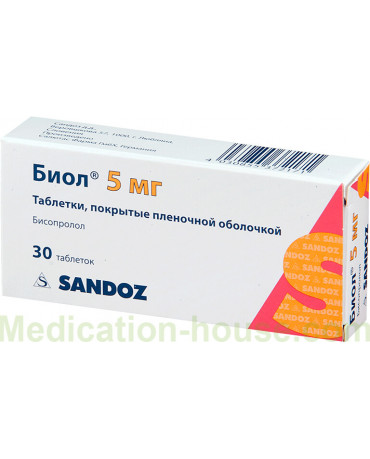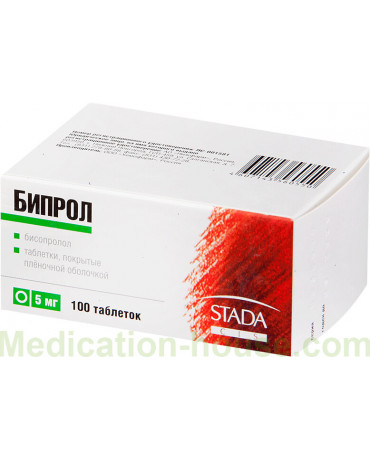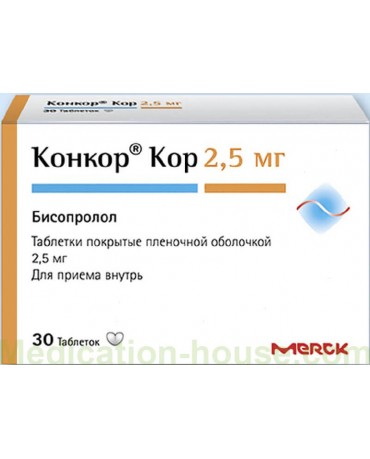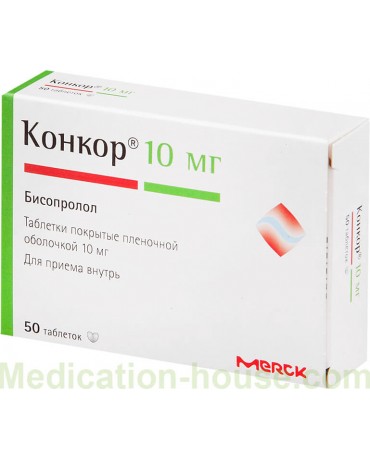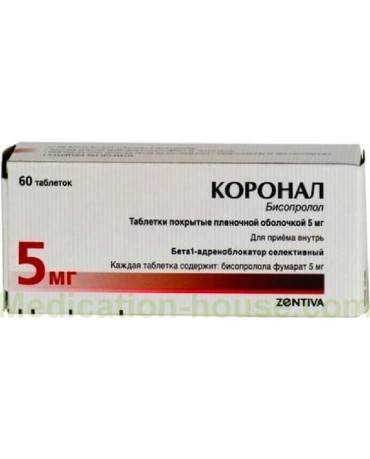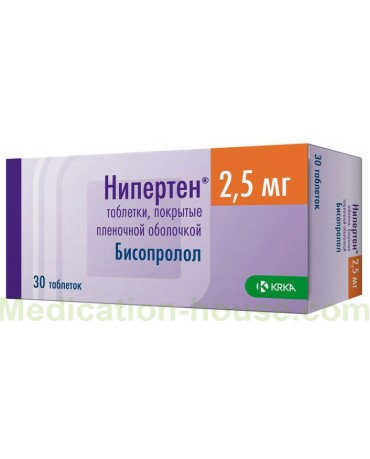User manual for Bisoprolol
Reed more and buy Bisoprolol on this page
Bisoprolol is a drug used in the treatment of diseases of the cardiovascular system.
Release form and composition
Bisoprolol is available in the form of film-coated tablets (10 pieces in a blister strip, 1 package in a cardboard box; 30 pieces in polymer or glass jars, 1 can in a cardboard box).
The active substance is bisoprolol fumarate, in 1 tablet - 2.5 mg, 5 mg or 10 mg.
Indications for use
The drug has antianginal (anti-ischemic) properties, which are expressed in the ability of the drug to reduce heart rate and myocardial contractility, which reduces myocardial oxygen demand and improves blood supply.
The hypotensive effect (decrease in blood pressure) of bisoprolol is due to its ability to reduce total peripheral resistance and reduce cardiac output.
The use of Bisoprolol allows you to stop tachycardia, inhibit the activity of the sympathetic nervous system, lower blood pressure, slow down atrioventricular conduction, which indicates the antiarrhythmic effect of the drug.
The active ingredient of the drug is bisoprolol fumarate. The maximum effect of this drug is observed 1-3 hours after oral administration and lasts for a day.
The drug is prescribed:
Arterial hypertension;
Exertional angina;
Coronary heart disease;
Myocardial infarction (for secondary prevention);
Chronic heart failure.
Also, the drug is effective in violation of the rhythm (sinus tachycardia, supraventricular and ventricular extrasystoles), arrhythmias against the background of mitral valve prolapse, thyrotoxicosis.
Contraindications
Contraindications to the use of Bisoprolol are:
Atrioventricular block II and III degree;
Cardiogenic shock;
Sick sinus syndrome;
Bradycardia;
Pronounced sinoatrial blockade;
Arterial hypotension;
Decompensation phase in heart failure;
Raynaud's disease, severe peripheral circulatory disorders;
Obstructive airway diseases, including bronchial asthma;
Concomitant use of monoamine oxidase inhibitors;
Pheochromocytoma;
Psoriasis;
Children under the age of 18;
Pregnancy and lactation period;
Hypersensitivity to bisopralol fumarate.
Caution when prescribing Bisoprolol is necessary for the following diseases: diabetes mellitus, metabolic acidosis, thyrotoxicosis, vasospastic angina, first-degree atrioventricular block.
Additional medical advice is required regarding the use of Bisoprolol with a strict diet and desensitizing (antiallergic) therapy.
Method of administration and dosage
It is recommended to take Bisoprolol in the morning, regardless of the meal. The tablets should be swallowed whole without chewing with water.
The dosage regimen is determined by the attending physician individually for each patient. The use of Bisoprolol for stable angina pectoris and arterial hypertension should be started with 2.5-5 mg per day, followed by an increase to 5-10 mg, not exceeding the daily dose of 20 mg.
In chronic heart failure, the use of the drug is possible only by patients who have been in a state of stabilization over the past 6 weeks. During the first week, such patients take 1.25 mg of the drug once a day. The second week the drug is prescribed 2.5 mg per day, the third week - 3.75 mg, from the fourth to the eighth week - 5 mg each, from the eighth to the twelfth week - 7.5 mg each, after the twelfth week the daily dose of Bisoprolol is increased up to 10 mg.
In patients with chronic heart failure, after the start of taking the drug, blood pressure, conductivity, heart rate should be checked for compliance with the norm within the first few hours. If all indicators are in order, a further increase in the dose is possible, if there are deviations, the drug must be canceled.
The maximum daily dose of the drug is 20 mg, however, patients with severe liver dysfunction and severe renal failure should not take more than 10 mg per day. The drug should be withdrawn slowly, reducing the dose gradually.
Side effects
Depression, sleep disturbances, headache, dizziness, hallucinations, numbness, tingling sensation;
Conjunctivitis, decreased tear production, visual impairment;
Deterioration of the condition of patients with Raynaud's syndrome or intermittent claudication (usually at the beginning of treatment);
Bradycardia, orthostatic hypotension, atrioventricular conduction disorder;
Nasal congestion, bronchospasm, shortness of breath;
Abdominal pain, vomiting, nausea, constipation, diarrhea, increased activity of liver enzymes in the blood;
Convulsions, muscle weakness, mono- or polyarthritis;
Skin rash, redness, itching, excessive sweating;
Tinnitus, hair loss, short-term memory loss, weight gain.
Special instructions
Bisoprolol is used with caution in psoriasis (including indications of a family history of psoriasis), diabetes mellitus in the decompensation phase, and a predisposition to the development of allergic reactions.
With pheochromocytoma, taking the drug is possible only after using alpha-blockers.
Before carrying out operations about taking Bisoprolol, it is necessary to inform the anesthesiologist.
The drug should be taken with caution by patients whose work is associated with the need for high concentration of attention and speed of psychomotor reactions.
Terms and conditions of storage
Shelf life - 3 years at storage temperatures up to 25 ° C.
Terms of sell
You don't need a prescription to buy Bisoprolol.


